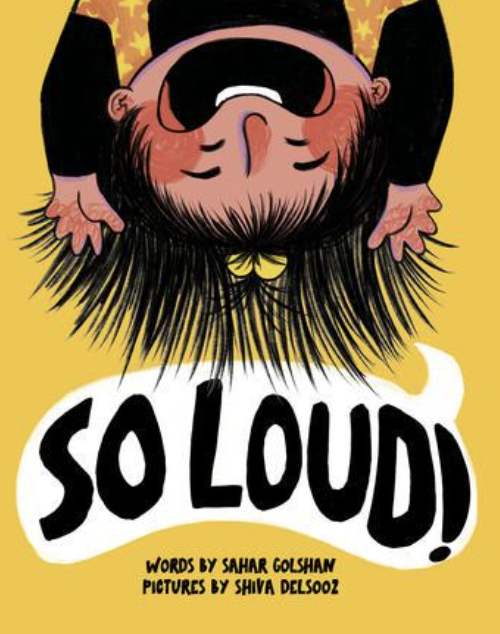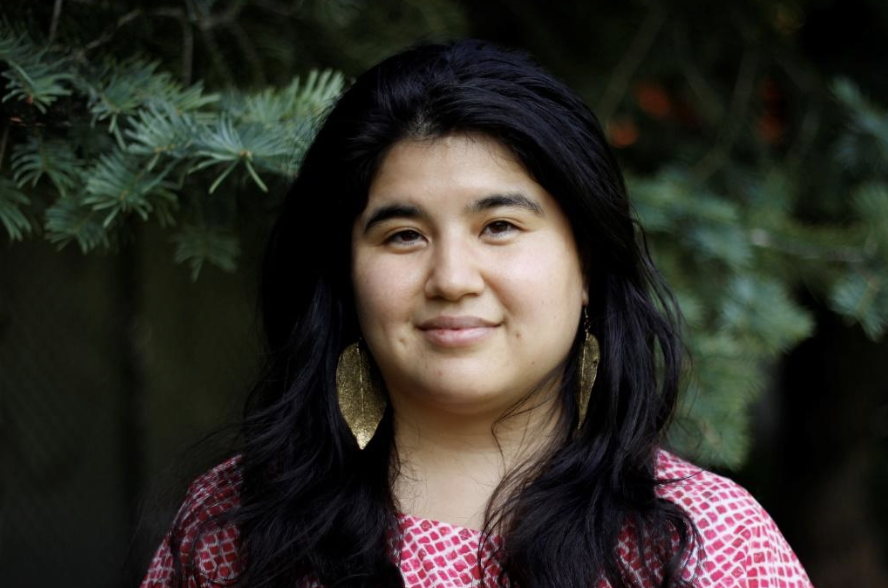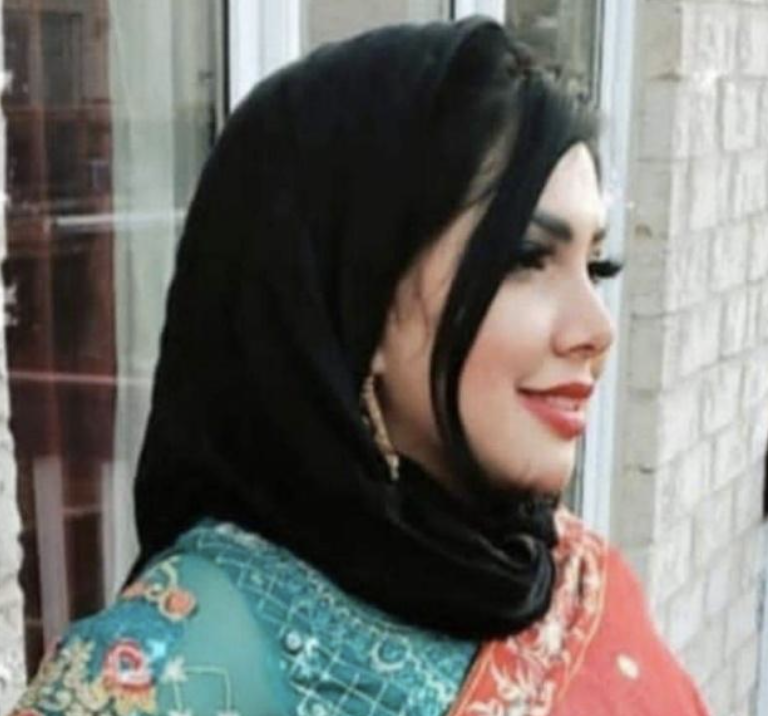
Cover of picture book So Loud!
Sumaiya Matin: I really enjoyed reading your debut picture book, So Loud! published by Annick Press. It is a charming and beautifully told story about a young girl finding and owning her voice. I’m thrilled for the opportunity to learn more about you and your work.
Sahar Golshan: Thank you for this interview. My sense is that it’s rare that picture book writers get the opportunity to provide long-form commentary on their stories. I’m grateful to get to say more about So Loud!
Sumaiya Matin: Before diving into So Loud! I’m curious to know, when did you first realize you wanted to be a writer?
Sahar Golshan: There were many “mini” moments when it dawned on me that writing was something I wanted to pursue. The earliest one involves stationery. Do you remember those binder dividers? In the summer before high school, I remember longingly decorating the front side of the divider I would use for my English class. Adorning the paper with my variously coloured pens, I sat in awe of what I perceived as the sacredness of stories.
Sumaiya Matin: You’ve mostly written nonfiction and So Loud! is your first children’s book – what inspired you to try writing from a child’s voice/perspective?
Sahar Golshan: I mainly wrote adult creative non-fiction for a handful of years, without ever contemplating writing a children’s book. I always assumed that my first published book would be a memoir. I also thought it would be my only genre. I would never have predicted that I’d write children’s fiction, let alone publish a picture book!
But the more I think about it, it makes total sense. Much of my creative non-fiction writing is about childhood. It often consists of immersive scenes written in the first person and the present tense. And from a reading perspective, picture books are truly my favourite books of all time. To date, they are the titles I recall with the most fondness, even if I haven’t read them in years.
So Loud! is fiction, but certainly inspired by my experiences in girlhood. As a little girl, I was told that I spoke and laughed too much, and too loudly. This disapproval from other people, both in jokes and in serious instructions to turn it down, really imprinted a sense of shame in me. It was during a period when I was exploring some of these memories in adult creative non-fiction writing that I wrote down the first seeds of this picture book.
How exhilarating it was to play with this story in this new way, this time with a lighter touch! I predict that creative non-fiction writing for adults will always be at the heart of my practice, but I feel so lucky to have found this new world. It has brought such joy and healing to me and my inner child.
Sumaiya Matin: Elaborating on this experience of healing and in connection to this issue’s theme of rebirth, in what ways has writing So Loud! changed or renewed you, personally and/or as an artist?
Sahar Golshan: Rebirth is at the heart of So Loud! The narrator, Rudy, loses a fundamental part of herself when she lowers her voice to please others. She regains her volume in the spring, which is when the Iranian New Year is celebrated. Norooz is considered an auspicious time of renewal.
Some women have told me that they resonate with Rudy’s story. They were told they were too loud as little girls. Some continue to hear similar comments as adults. Of course, this is my story too. Rudy’s return to her vitality emboldens me to take up space, even in a world that conditions feminine people to privilege the comfort of others before their own.
Producing a book is by definition an act of expression. It’s allowed me to prioritize my voice and take up space. To challenge gendered beliefs about being “too much”.
When I read the book out loud, one of my favourite parts is performing the narrator making the sound of a lion. When Rudy roars, I do too!
Sumaiya Matin: You’re Teochew-Chinese and Persian and you’ve also got an interest in learning different languages. In what ways does your experience in different cultural and linguistic worlds impact your storytelling?
Sahar Golshan: So Loud! is written in English but holds some words in Persian. The story involves an important visit from the narrator’s grandmother who lives in Iran.
I met my Iranian grandparents just once as a child, only to be reunited with them again in adulthood on two brief occasions. All of my Iranian family lives in Iran. I learned to speak Persian as an adult. It was a very meaningful process for me. The Persian language is something I hold with great love and privilege. I wonder if writing this book was a form of honouring the pivotal experience of being able to meet my grandparents as a six-year-old, and how much significance those weeks held for me as a child and even now as an adult in her 30s.
Although the narrator of the story is also Teochew, I haven’t had the opportunity to speak much about my experiences as a Teochew person with the book. Thank you for highlighting my Teochew-Chinese heritage. I got to grow up with my Teochew grandparents, and the Teochew language. To this day, I still participate in various cultural customs.
I am lucky that different languages continue to make up my every day, and they certainly play a role in developing the stories I want to tell.
Sumaiya Matin: My favourite part of So Loud! other than the concept itself, are the similes and metaphors used to capture the main character, Rudy’s, internal experience (e.g., tap, husky, lion). What was the process that led you to use these specific devices?
Sahar Golshan: Thank you! The husky was inspired by a real-life husky that lived in the basement suite of the house where I lived while I wrote the book. I am a very deep sleeper, but I noticed that sometimes the husky howled in the middle of the night! I thought about how a husky’s howl was akin to Rudy’s tremendously loud voice: a fundamental expression that flows out naturally.
The lion came through as a reference to the lion women of Iran, who raise their voices every day of the year, even in the face of consistent violence and censorship. Their power is an invaluable inheritance and source of pride for me as an Iranian diasporic woman. This book is dedicated to the women and gender diverse people of Iran who rebel against patriarchal forces that demand their silence.
The tap came from Rudy’s full first name: Rudābeh. As revealed in the book, Rudābeh means river. I thought about Rudy’s fabulous voice as a current of a river. When it’s on full blast, the current is forceful. When her voice is lowered, it’s like the slow peaceful movement of a river in quiet motion.
Looking back, the films I watched in the year before I wrote the book influenced me too. In 2021, I got to learn about film criticism. I was a participant in a program called the Youth Critics Initiative (YCI). YCI is run by TACLA, in partnership with the Toronto Reel Asian International Film Festival. While in the program, I watched a feature-length documentary called DAMASCUS DREAMS by director Émilie Serri. One of the subjects of this film is a middle-aged Syrian man. He sings a gorgeous song about a water tap in the film. I also watched a short film called LA LUZ DE MASAO NAKAGAWA by director Hideki Nakazaki. There’s a dripping water tap that acts as the soundtrack for much of the film that I love.
In many ways, the book could have been called So Dynamic! because I wanted to use all these different devices to demonstrate that the narrator’s voice changes. There are abundant ways that the narrator can choose to take up space in the world.
Sumaiya Matin: What is next for you?
Sahar Golshan: As for my future writing projects, I have definitely caught the picture book bug! I’ll also be continuing to write more creative non-fiction for adults. In fact, I want to have a multi-genre writing career. I am excited to see how more new forms will surprise me, including non-book media.
Follow @sahargolshanwriting on Instagram or visit my website http://www.sahargolshan.com to learn more about my projects and upcoming events.

Photo credit: Dinaly Tran
Sahar Golshan is the author of So Loud! a picture book published in 2024 with Annick Press. So Loud! is illustrated by Shiva Delsooz. Sahar is a Teochew-Chinese and Persian writer, a language learner, and the director of the short documentary KAR (2019). She is a winner of the Marina Nemat Award for Creative Writing in Non-Fiction and the Air Canada Short Film Award. Her writing has appeared in Room, Taclanese, Shameless, The Ex-Puritan, and Tongues: On Longing and Belonging through Language. She has facilitated creative writing workshops and courses at the University of Guelph, the University of Toronto, and the Toronto Public Library.
 Sumaiya Matin is a South Asian Canadian writer, social worker/psychotherapist, and public policy professional. She has a Master in Social Work and a graduate certificate in creative writing from the Humber School for Writers. She is currently working toward her Master of Fine Arts (in Creative Writing) at the University of British Columbia. Sumaiya is passionate about exploring the intersection of literature and mental health. In 2021, she released a literary memoir titled The Shaytan Bride: A Bangladeshi Canadian Memoir of Desire and Faith (Toronto: Dundurn Press, 2021) which speaks to themes such as migration, identity, mental health, and honour-based violence. Her other non-fiction work can be found in magazines such as Poetry is Dead and Living Hyphen.
Sumaiya Matin is a South Asian Canadian writer, social worker/psychotherapist, and public policy professional. She has a Master in Social Work and a graduate certificate in creative writing from the Humber School for Writers. She is currently working toward her Master of Fine Arts (in Creative Writing) at the University of British Columbia. Sumaiya is passionate about exploring the intersection of literature and mental health. In 2021, she released a literary memoir titled The Shaytan Bride: A Bangladeshi Canadian Memoir of Desire and Faith (Toronto: Dundurn Press, 2021) which speaks to themes such as migration, identity, mental health, and honour-based violence. Her other non-fiction work can be found in magazines such as Poetry is Dead and Living Hyphen.